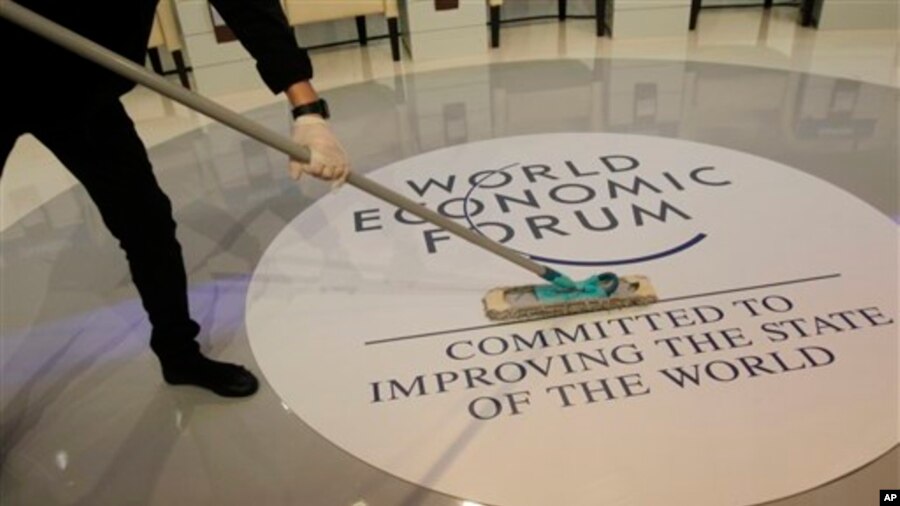>Biotech, 3D Printing Lead to 5 MILLION FEWER JOBS IN NEXT 5 YRS: World Economic Forum, Davos Switz.
Paris (AFP) 10 hrs. ago - The latest industrial revolution will not only bring us 3-D printing and biotechnology advances, but the loss of five million jobs in the next five years, according to a report prepared for the Davos forum of business and political elites.
>The so-called FOURTH INDUSTRIAL REVOLUTION "will cause widespread disruption not only to business models but also to labour markets over the next five years", the World Economic Forum said announcing a study released ahead of the Davos forum this week.
Following the first industrial revolution of steam engines, then electricity and assembly lines, followed by electronics and robotics, the fourth industrial revolution will include a number of developments like big data and smart systems to transform the economy.
But that transformation will lead "...to a net loss of over 5 million jobs in 15 major developed and emerging economies," said the WEF, after analysing the potential impact on the economies of the *United States, Germany, France, China, Brazil and other countries.
>It sees as many as 7.1 million jobs being lost, mostly in white-collar office and administrative roles, with the creation of 2.1 million new jobs in fields such as computer engineering and mathematics.
>"Without urgent and targeted action today to manage the near-term transition and build a workforce with futureproof skills, governments will have to cope with ever-growing unemployment and inequality, and businesses with a shrinking consumer base," the World Economic Forum's executive chairman, Klaus Schwab, warned in a statement.
A separate study found WOMEN will be "in the firing line" of the changes, which "may have a disproportionately negative impact on women".
While the job losses will be relatively equal, with 52 percent of the expected 5.1 million job losses hitting MEN, in fact men still dominate the labour markets, so at 48 percent the job losses among women will be relatively higher than their participation in the jobs market.
Moreover, women are underrepresented in the TECHNICAL FIELDS where NEW JOBS are to be created.
- LINK: http://finance.yahoo.com/news/biotech-3-d-printing-lead-5m-fewer-jobs-141735215.html;_ylt=AwrC1jEbhJ1WtQIAyGbQtDMD;_ylu=X3oDMTByOHZyb21tBGNvbG8DYmYxBHBvcwMxBHZ0aWQDBHNlYwNzcg--
- WEBSITE: World Economic Forum, Jan. 20-23, 2016, Davos-Klosters, Switzerland. See below, *LINK: Fourth Industrial Revolution. http://www.weforum.org/


appalachiablue
(41,132 posts)World Economic Forum, "THE FOURTH INDUSTRIAL REVOLUTION, WHAT IT MEANS AND HOW TO RESPOND" SECTION.
http://www.weforum.org/agenda/2016/01/the-fourth-industrial-revolution-what-it-means-and-how-to-respond
~ EXCERPT ~
- CHALLENGES AND OPPORTUNITIES -
Like the revolutions that preceded it, the Fourth Industrial Revolution has the potential to raise global income levels and improve the quality of life for populations around the world. To date, those who have gained the most from it have been consumers able to afford and access the digital world; technology has made possible new products and services that increase the efficiency and pleasure of our personal lives. Ordering a cab, booking a flight, buying a product, making a payment, listening to music, watching a film, or playing a game—any of these can now be done remotely.
In the future, technological innovation will also lead to a supply-side miracle, with long-term gains in efficiency and productivity. Transportation and communication costs will drop, logistics and global supply chains will become more effective, and the cost of trade will diminish, all of which will open new markets and drive economic growth.
At the same time, as the economists Erik Brynjolfsson and Andrew McAfee have pointed out, the revolution could yield GREATER INCOME INEQUALITY, particularly in its potential to disrupt labor markets. As automation substitutes for labor across the entire economy, the net displacement of workers by machines might exacerbate the gap between returns to capital and returns to labor. On the other hand, it is also possible that the displacement of workers by technology will, in aggregate, result in a net increase in safe and rewarding jobs.
We cannot foresee at this point which scenario is likely to emerge, and history suggests that the outcome is likely to be some combination of the two. However, I am convinced of one thing—that in the future, talent, more than capital, will represent the critical factor of production. >This will give rise to a JOB MARKET increasingly segregated into “low-skill/low-pay” and “high-skill/high-pay” segments, which in turn will lead to an increase in SOCIAL TENSIONS.
In addition to being a key economic concern, INEQUALITY represents the greatest societal concern associated with the Fourth Industrial Revolution. The largest BENEFICIARIES of innovation tend to be the providers of intellectual and physical capital—the innovators, shareholders, and investors—which explains the rising gap in wealth between those dependent on capital versus labor. Technology is therefore one of the main reasons why incomes have stagnated, or even decreased, for a majority of the population in high-income countries: the demand for highly skilled workers has increased while the demand for workers with less education and lower skills has decreased. >The result is a job market with a strong demand at the high and low ends, but a hollowing out of the MIDDLE.
This helps explain why so many workers are disillusioned and fearful that their own real incomes and those of their children will continue to stagnate. It also helps explain why MIDDLE CLASSES around the world are increasingly experiencing a pervasive sense of dissatisfaction and unfairness. A winner-takes-all economy that offers only limited access to the middle class is a recipe for DEMOCRATIC MALAISE AND DERELICTION.
>DISCONTENT can also be fueled by the pervasiveness of digital technologies and the dynamics of information sharing typified by social media. More than 30 percent of the global population now uses social media platforms to connect, learn, and share information. In an ideal world, these interactions would provide an opportunity for cross-cultural understanding and cohesion. However, they can also create and propagate unrealistic expectations as to what constitutes success for an individual or a group, as well as offer opportunities for extreme ideas and ideologies to spread.
